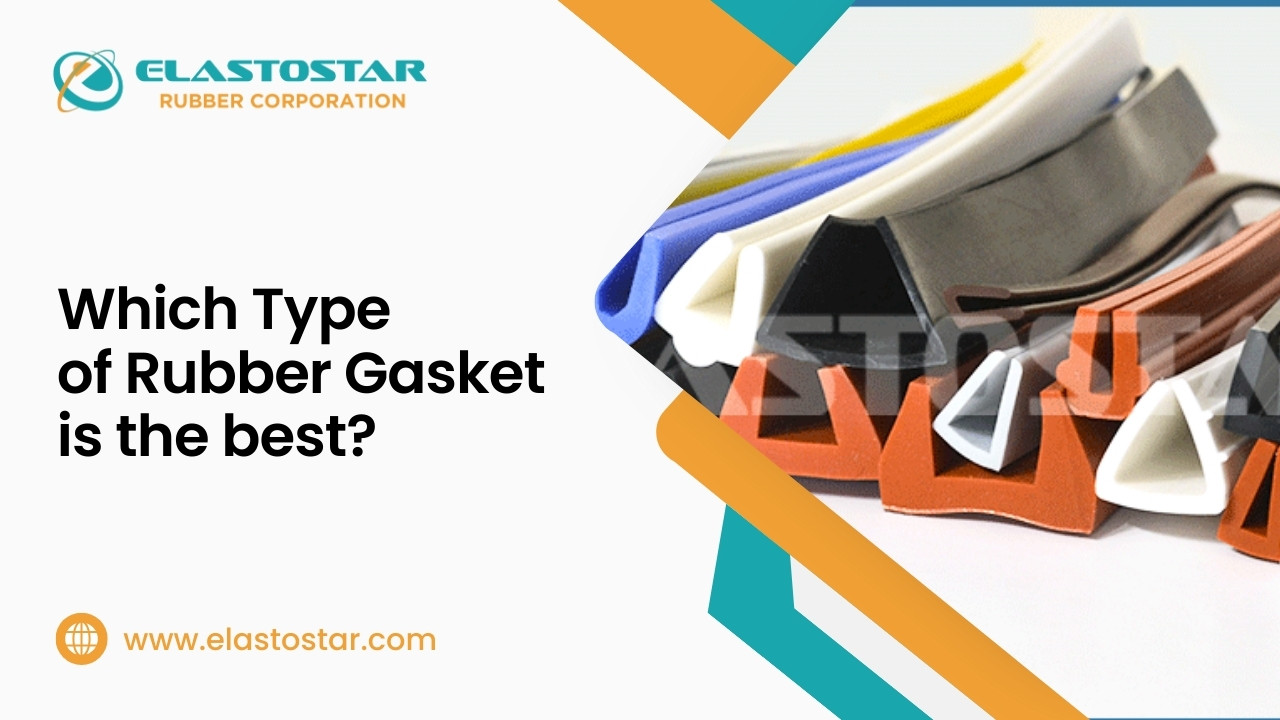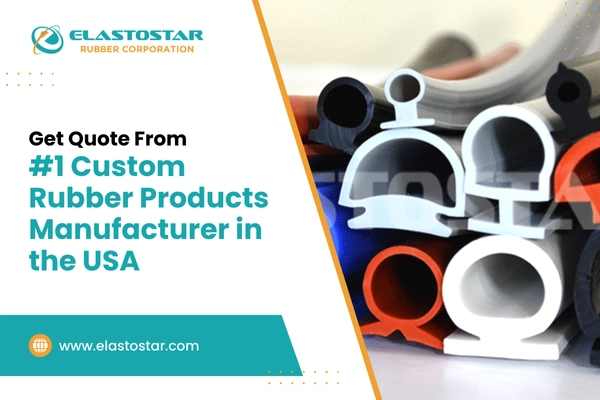
Rubber gaskets play an important role in creating a secure seal between surfaces, preventing leaks and protecting components in applications ranging from industrial machinery to automotive engines. By filling gaps, gaskets ensure that liquids, gases, or other substances don’t escape, which is essential for the smooth operation and longevity of equipment.
Selecting the right gasket material is crucial—silicone is perfect for high-temperature environments, while EPDM offers excellent UV and weather resistance, making it ideal for outdoor use. Understanding the types of gaskets and their specific properties helps you choose the best option for reliable, long-lasting performance.
Let’s explore the different types of rubber gaskets to find out which material is best for your application!
Table of Contents
What is a Rubber Gasket?

A rubber gasket is a sealing component made from flexible rubber materials, designed to fill gaps between two surfaces to prevent leaks and protect components. Rubber gaskets are essential in many applications, including automotive, food, and industrial machinery, as they ensure liquids, gases, and other substances do not escape from sealed areas. Common types of rubber gasket materials include FDA Grade Silicone for food applications, EPDM for outdoor durability, and Nitrile for oil resistance. Choosing the right rubber gasket material is crucial for reliable performance and long-lasting seals.
Factors in Choosing the Right Rubber Gasket
Selecting the right rubber gasket involves evaluating several key performance factors to ensure it meets the demands of your application.
- Performance Needs
- Temperature Resistance: Ensure the material can withstand the operating temperature. For high temperatures, consider Fluorosilicone.
- Chemical Compatibility: Choose materials that resist the chemicals present in the application. Fluorosilicone is ideal for chemical resistance.
- Durability: Select a durable material that can handle wear and pressure over time.
- Application-Specific Requirements
- Food and Medical Standards: For food-grade or medical applications, use FDA Grade Silicone to meet safety regulations.
- High-Purity Needs: In applications requiring purity and durability, Platinum Cured Silicone is a suitable choice.
- Electrical Conductivity: For applications needing conductivity, Conductive Silicone provides effective sealing and electrical performance.
Types of Rubber Gasket Materials
Choosing the right rubber gasket material depends on the specific requirements of the application, such as temperature resistance, chemical compatibility, and industry standards.
- Neoprene
- Known for excellent weather resistance, Neoprene is widely used in piping gaskets and outdoor applications where durability against environmental factors is essential.
- Nitrile (Buna-N)
- With outstanding oil and fuel resistance, Nitrile (or Buna-N) is ideal for automotive and industrial applications where exposure to oils and fuels is common.
- EPDM
- EPDM provides strong resistance to UV rays, ozone, and weather, making it popular for HVAC systems and other outdoor applications that face constant environmental exposure.
- Silicone
- Known for high-temperature tolerance and flexibility, Silicone is FDA compliant, making it perfect for the food and medical industries where safety and purity are required.
- Viton (FKM)
- Viton offers superior chemical and fuel resistance, making it an excellent choice for high-performance applications in challenging environments.
- Butyl
- Butyl rubber is valued for its gas impermeability and chemical resistance, making it suitable for industrial applications requiring strong seals.
- Specialty Rubbers
- Platinum Cured Silicone: Used in high-purity applications due to its non-toxic and durable properties. For more on its benefits, visit our detailed article on Benefits of Platinum Cured Silicone Rubber Application.
- Metal/X-Ray Detectable Silicone: Designed for food and pharmaceutical industries to ensure product safety.
- Food Grade Closed Cell Sponge Silicone: Ideal for applications that require food-safe, compressible gaskets.
Rubber Gasket Specifications and Technical Details
Understanding the specifications and technical properties of rubber gaskets helps in selecting the best material for the job based on durability, temperature range, and chemical resistance.
- Physical Properties
- Rubber gaskets vary in tensile strength, hardness, and flexibility. For instance, Conductive Silicone provides electrical conductivity along with flexibility, while EPDM offers excellent resilience and durability.
- Temperature Range
- Different gasket materials have specific temperature ranges. Silicone can handle extreme temperatures, making it suitable for high-heat environments, while Viton is another excellent choice for applications with high-temperature demands. To learn about silicone safety and durability standards, -read our article on What is UL Rating? Its Importance for Silicone Rubber.
- Chemical Resistance
- Chemical compatibility is crucial in environments exposed to oils, fuels, and harsh substances. Nitrile rubber is well-suited for oil and fuel exposure, while Fluorosilicone provides enhanced chemical resistance, ideal for industrial applications.
| Specification | Description | Ideal Materials |
| Physical Properties | Tensile strength, hardness, and flexibility are important for durability and application fit. | Conductive Silicone, EPDM |
| Temperature Range | Ability to withstand high or low temperatures without degrading. | Silicone, Viton |
| Chemical Resistance | Resistance to oils, fuels, and chemicals, ensuring longevity in harsh environments. | Nitrile, Fluorosilicone |
Common Applications for Rubber Gasket Types

Rubber gaskets are essential across various industries, each requiring specific materials to meet unique application needs.
- Automotive Industry
- Nitrile and Viton gaskets are widely used in fuel systems, engines, and seals, where resistance to oils, fuels, and high temperatures is essential.
- Food and Medical Applications
- FDA Grade Silicone and Platinum Cured Silicone gaskets are ideal for food and medical-grade applications, meeting strict safety and purity standards.
- Outdoor & HVAC
- EPDM and Neoprene gaskets are used for their weather-resistant properties, making them suitable for outdoor applications and HVAC systems that are exposed to environmental elements.
- Heavy Industry
- Butyl and Metal/X-Ray Detectable Silicone gaskets are chosen for specialized industrial uses where chemical resistance, gas permeability, and detectability in food and pharmaceutical production lines are important.
Types of Rubber Gaskets Offered by Elastostar
Elastostar provides a range of specialized rubber gaskets designed for diverse applications, each customized to meet specific sealing and protection needs.
- D-Shaped Rubber Seals & Gaskets
- These D-shaped rubber seals are perfect for applications that require a tight and secure fit, offering effective sealing in various settings.
- Die-Cut Gaskets
- Die-cut gaskets are custom-shaped using precise die-cutting techniques, ideal for applications with unique dimensions.
- Extruded Bulb Gaskets
- These extruded bulb gaskets provide flexibility and are commonly used in automotive and industrial applications where a strong, adaptable seal is needed.
- Rubber Lip Seals & Gaskets
- Designed to keep out dust, moisture, and contaminants, rubber lip seals are essential for applications that need enhanced protection.
- Silicone Rubber Gaskets
- Elastostar offers a variety of silicone rubber gaskets, including Food Grade Closed Cell Sponge Silicone, FDA Grade Silicone, and Platinum Cured Silicone. These options are ideal for food, medical, and high-temperature applications, meeting industry standards for purity and durability.
Comparing Rubber Gasket Materials by Need
| Application Need | Material Comparison | Best Options |
| Oil & Fuel Resistance | Nitrile: Great for oil resistance, ideal for automotive. Viton: High fuel and chemical resistance for demanding uses. | Nitrile, Viton |
| Weather & UV Resistance | EPDM: Strong resistance to UV and weather, perfect for outdoor uses. Neoprene: Good for weather and outdoor applications. | EPDM, Neoprene |
| High-Temperature Needs | Silicone: Tolerates high heat, used in food and medical settings. Fluorosilicone: Holds heat and chemicals. Platinum Cured Silicone: High purity and heat tolerance for sensitive applications. | Silicone, Fluorosilicone, Platinum Cured Silicone |
Advantages of Popular Rubber Gasket Materials
Each rubber gasket material has unique advantages that make it suitable for specific applications.
- Nitrile (Buna-N)
- Excellent oil resistance, making it a top choice for automotive and industrial applications.
- Neoprene
- Versatile and weather-resistant, suitable for outdoor use and marine environments.
- EPDM
- Strong resistance to UV rays, ozone, and weather, ideal for HVAC and outdoor applications.
- Silicone
- High temperature tolerance and FDA compliance, perfect for food, medical, and high-temperature applications.
- Viton
- Outstanding chemical and fuel resistance, ideal for demanding and high-performance uses.
- Butyl
- Known for chemical resistance and gas impermeability, making it suitable for various industrial applications.
Tips for Choosing the Best Rubber Gasket for Your Needs
Selecting the right rubber gasket involves matching material properties with specific application requirements for optimal performance.
- Identify Key Requirements
- Evaluate factors like temperature tolerance, chemical exposure, and environmental conditions to determine the best material for your application.
- Consult with Experts
- Seek guidance from custom seal manufacturers like Elastostar to ensure you choose a gasket material suited to your needs.
- Use Material-Specific Guides
- For specific applications, consider FDA Grade Silicone for food and medical uses, or Conductive Silicone for electronic applications requiring conductivity.
Custom Rubber Gaskets from Elastostar Rubber Corporation
At Elastostar Rubber Corporation, we are a trusted custom rubber product manufacturer known for our dedication to quality and precision. Our focus on FDA Grade Silicone and Conductive Silicone gaskets ensures that our products meet industry standards for safety, durability, and performance across a wide range of applications.
With extensive expertise in silicone rubber extrusion and specialized materials, we offer fully customized solutions customized to meet the specific requirements of our clients. Whether you need gaskets for food, medical, automotive, or industrial use, our team is committed to delivering high-quality, reliable products that enhance the performance and longevity of your equipment.
Recommended Reads
- Benefits of Platinum Cured Silicone Rubber Application
- EPDM Rubber: Meaning, Benefits & Applications
- What Makes Heat-Resistant Silicone So Popular?

Conclusion
Choosing the right rubber gasket material is important to ensure effective sealing, durability, and performance in any application. Each type of gasket material, from FDA Grade Silicone for food safety to EPDM for outdoor resilience, offers unique benefits suited to specific needs. Selecting a material that aligns with the environment and requirements of your application ensures reliability and longevity. As a trusted custom rubber product manufacturer, Elastostar provides a wide range of high-quality gasket materials and offers customized solutions to meet any sealing challenge.
FAQs
- What is the best rubber for gaskets?
Elastostar Rubber corporation recommends Silicone for high temperatures, Nitrile for oil resistance, and EPDM for weather and outdoor durability, ensuring the best fit for each application. - What type of rubber gaskets are there?
Elastostar offers Silicone, EPDM, and gaskets, each chosen for its unique properties suited to specific industrial and commercial uses. - Which is better, PTFE or EPDM gaskets?
PTFE gaskets offer high chemical resistance, making them suitable for harsh chemicals, while EPDM gaskets excel in weather resistance and outdoor durability, particularly for UV and ozone exposure. - What is the longest lasting gasket material?
Viton and Silicone are among the longest-lasting gasket materials, especially in high-temperature and chemically intense environments, offering durability and resistance to degradation. - What is an EPDM rubber gasket?
An EPDM rubber gasket is made from a synthetic rubber known for its excellent resistance to UV, ozone, and weather, making it ideal for outdoor applications and HVAC systems. - Which is better, Viton or NBR?
Viton is superior for high-temperature and chemical-resistant applications, while NBR (Nitrile) is a cost-effective choice for oil and fuel resistance. Elastostar Rubber Corporation recommends Viton for demanding environments and NBR for automotive and industrial uses, providing reliable performance across applications.



